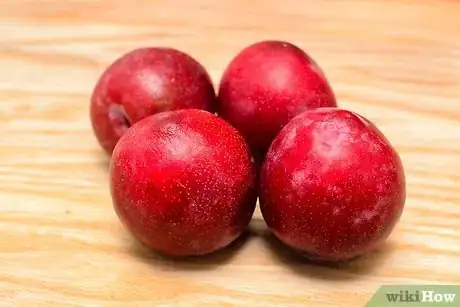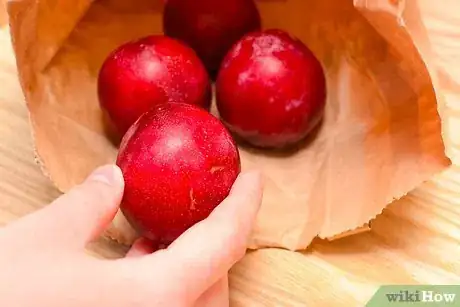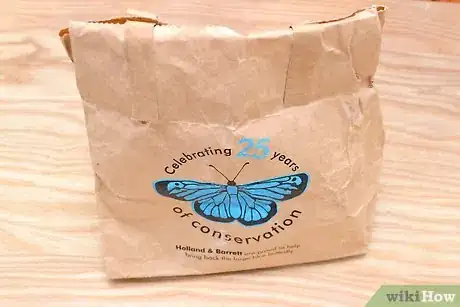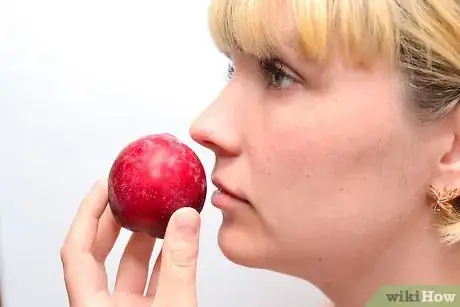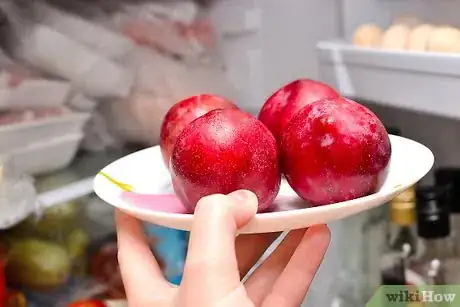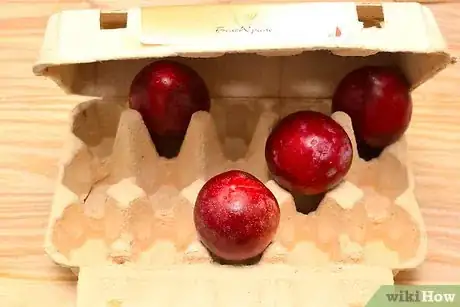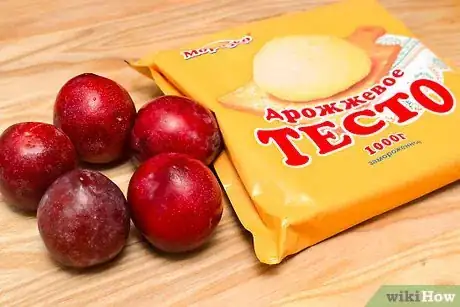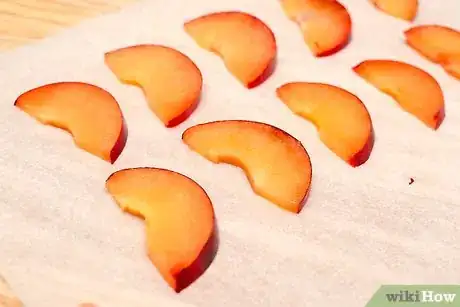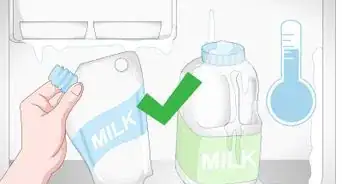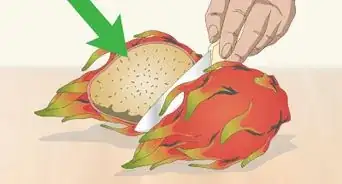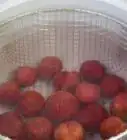This article was co-authored by wikiHow Staff. Our trained team of editors and researchers validate articles for accuracy and comprehensiveness. wikiHow's Content Management Team carefully monitors the work from our editorial staff to ensure that each article is backed by trusted research and meets our high quality standards.
wikiHow marks an article as reader-approved once it receives enough positive feedback. In this case, 88% of readers who voted found the article helpful, earning it our reader-approved status.
This article has been viewed 142,164 times.
Learn more...
Fragrant, juicy plums need to be handled with care in order to last for a long time once you've brought them home. Storing them incorrectly will cause them to spoil quickly or lose their sweet flavor and become mealy. See Step 1 and beyond to learn how to store plums that have not yet ripened and those that have reached their peak.
Steps
Storing Unripe Plums
-
1Purchase or pick good plums. Look for plums that are free of blemishes, discoloration, and soft spots. You can ripen plums at home, so the important thing is to make sure you're picking plums from a good batch - it's okay if they're still a little hard.
-
2Place the unripe plums in a paper bag. If your plums do not yet smell fragrant and feel slightly soft to the touch, they need to ripen outside the refrigerator for a few days. As plums and other fruits ripen, they release ethylene. Placing them together in a paper bag surrounds the plums with this gas and causes them to ripen more quickly.
- Don't put unripe plums in the refrigerator. They won't be able to continue the ripening process in the cold climate, and you'll end up with chill-damaged plums, which are tasteless and mealy.
- If you aren't in a hurry for the plums to ripen, you can put them in a bowl on the counter instead of in a paper bag. They'll take an extra day or so to ripen.
Advertisement -
3Let the plums ripen at room temperature. They'll ripen best when kept at a temperature of 68 to 77 Fahrenheit. Don't store them at a cooler temperature until they're fully ripe.
- Make sure the plums don't get too hot; placing them in a sunny window might cause the to overheat, making them rot more quickly.
-
4Check the plums for ripeness. Smell the plums. Do they smell rich, fragrant and fresh? Feel the plums. Do they indent slightly when you press your thumb into their sides? If so, the plums are ripe, and ready to either eat or go into longer-term storage.[1]
- Plums' skin takes on a dusty look as it begins to ripen.
- Catch the plums before they get too soft, or juice begins to squeeze out from the skin; this means they're overripe.
Storing Ripe Plums
-
1Store ripe plums in the refrigerator. This will keep them in top shape and prevent fast deterioration. Place them in an open plastic bag - not a sealed one. Plums stored in the refrigerator will last two to four weeks.[2]
- Make sure your refrigerator is clean and free of heavy smells. Plums tend to take on the smell of the refrigerator after a few days.
- Put them in the crisper section of the refrigerator.
-
2Prevent bruising by storing plums inside old egg cartons. One plum per egg space does the trick. Make sure heavier produce doesn't get stored on top of the plums.
-
3Eat plums soon after picking or purchasing. Plums can be stored for several weeks, but they definitely taste best when they're fresh. The sooner you can eat them after they ripen, the better. If you have a big bushel of plums to use up, try making one of these delicious dishes:
- Plum cake is a popular way to celebrate summer's bounty of plums.
- Vodka-infused plums are a flavorful topping for ice cream.
- If you have little ones in your house, plum puree makes a special, healthy summer treat.
- Spoiled plums don't have to go to waste - they can be stewed.
Processing Plums for Longer Storage
-
1Freeze plums. Frozen plums will keep for several months, and up to a year. Choose plums that are at their peak flavor and ripeness - underripe plums won't taste good when you thaw them.
- Wash the plums and dry them.
- Slice the plums into wedges and remove the pits.
- Lay the wedges on a cookie sheet.
- Freeze the plum wedges.
- Place the frozen wedges in a food storage bag or bin.
- Label the food storage bag or bin with the date and put it back in the freezer.
-
2Make plum jam. This is an excellent way to preserve your plums so they last for months to come. You'll need to peel your plums to remove the skins before combining the flesh with sugar, pectin and lemon juice. Store your jam in sterilized jars and enjoy it all through the winter months.
Community Q&A
-
QuestionI stewed plums 6 days ago and stored them in the fridge. Are they safe to eat now?
 Community AnswerIf they look good and smell good, take a tiny taste. If they taste okay, put them in a pot with a small amount of water and boil for two minutes for good measure.
Community AnswerIf they look good and smell good, take a tiny taste. If they taste okay, put them in a pot with a small amount of water and boil for two minutes for good measure. -
QuestionIs it safe to make jelly out of plums that have been frozen for five years?
 Community AnswerFive years is a little past its time. If your freezer has never been faulty in all those years, there is nothing to suggest it isn't safe, but realistically you should just throw them out and buy new plums. Your jelly will probably taste quite gross if you use the frozen ones.
Community AnswerFive years is a little past its time. If your freezer has never been faulty in all those years, there is nothing to suggest it isn't safe, but realistically you should just throw them out and buy new plums. Your jelly will probably taste quite gross if you use the frozen ones. -
QuestionShould plums be washed before putting them in paper bag (or later in the refrigerator)?
 Allison SchickTop AnswererFruits typically stay fresher if they are not washed until you wish to eat them.
Allison SchickTop AnswererFruits typically stay fresher if they are not washed until you wish to eat them.
Things You'll Need
- Paper bag
- Refrigerator
References
About This Article
To store plums that aren't ripe yet, put them in a brown paper bag and store them at room temperature until they're fully ripened. If your plums are already ripe, store them in the fridge for up to a month. For long-term storage, slice the plums into wedges and spread them out on a lined baking sheet. Then, put them in the freezer for several hours before transferring them to a freezer bag. You can store your plums in the freezer for up to a year. If you want to learn how to store plum jam, keep reading the article!
